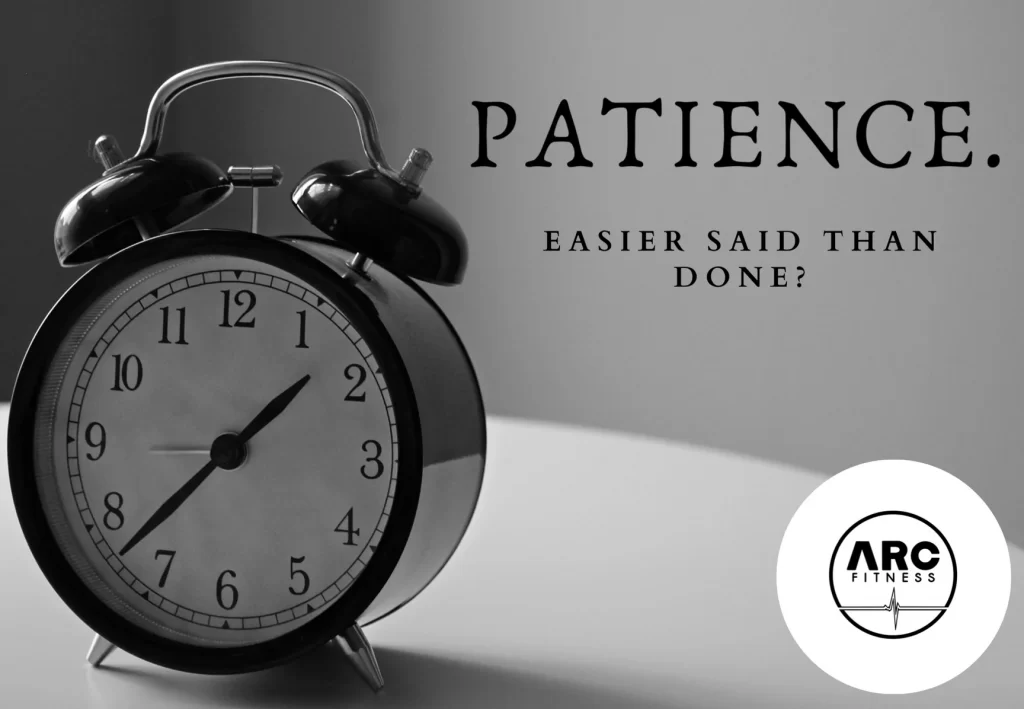No products in the basket.
Arc Fitness
Patience: Easier said than done?
Today I am writing about my favourite topic. PATIENCE.
Patience can be defined as:
“The ability to bear pains and trials calmly without complaint.”
I’m not writing it because I am a patient person, no, it’s for the exact opposite reason. I am a work in progress too. The desire to have something right now is easy in today’s environment, food, movies, amazon prime. We hate to wait. I hate to wait.
Now imagine what that feels like for someone coming to terms with recovery. When I mention the word ‘patience’ to anyone I know struggling in early recovery I am almost feel the imaginary ‘punch in the face’ they have just given me. I used to think that this was a learned problem, that I was always an impatient person until I did some digging into the subject and found it has a biological factor also.
During the time-frame of someone’s addiction, individuals do not exercise a great deal of patience, if any. This is because the part of the brain that is hyper-activated by addiction – the mid brain – is part of the reward centre. The happy feel good part. The mid brain is actually what drives us to act impulsively, in order to make sure our needs get met (sound familiar all you opportunists out there?).
During addiction, the mid brain is over-stimulated, leading to increasingly impulsive and irrational behaviours over time. Impatience stems from that urge for instant gratification being stronger than other values like patience, responsibility or empathy for others. I always put my needs first at the detriment of others, my value system became unbalanced.
When I entered recovery, I knew it was very important for me to actively work on patience. Having patience can help you better mentally prepare for the time, commitment and ups and downs of recovery, and there will be ups and downs trust me). Addiction caused a great deal of havoc in my life. It took many years before I even reached a point in my life where I was willing to stop and by this time my life was a real mess.
Giving in was a great start, but it is unrealistic to expect that things will be put right overnight. It took a few years into my recovery before finding the peace and happiness I wanted.
The good news is that there a few things you can do during treatment and recovery to help develop patience:
Don’t take a short way out.
Try giving each recovery activity your full attention and if you follow a 12-step approach – really work the steps. It’s always good to remind yourself that the best way to do things is not always the fastest way.
Try things that require patience.
For example, exercise. Physical exercise not only help me manage stress but also because it helped train me to sacrifice instant gratification for a greater reward later. The results took time. Studying nursing required some sacrifice at the start, to achieve a goal in the future.
Practice meditation or mindfulness.
These techniques will help you to stay in the moment rather than lose your patience worrying about the future. Meditation and breathing techniques can also help you release any pent-up anger or frustration that may be causing you to lose your patience easily. I highly recommend this when dealing with queues in shops – this is where it rears its head for me most of the time
Be thankful.
When we are impatient about our progress, we actually lose sight of where we are now. If you’re thankful for what you have today, you’re less desperate for more and better things to happen in the future.
Exercising patience in your recovery, and life, will help you stay sober and change the way you live your life.
Don’t lose sight of the progress you have already made up until this point. Be thankful you are not caught up the middle of some drug fueled chaos or drunken argument.
You will get there.
Watch the Video

